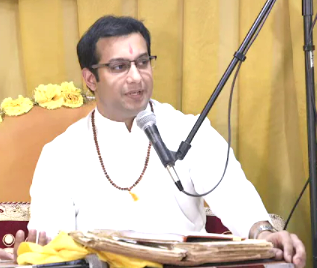From a satsang with Pt. Vasistha Persad, SWAHA Om Shakti Mandali
The following katha is an excerpt from the Mahaa Shiv Puraan. It is an itihaas that demonstrates transformation. It is about an individual who, due to challenging circumstances, had to devote herself to none other than Shivaji and the resulting vardaan (boon) that she received. There are three stories here: the story of Rishika, a young Brahmin girl, the story of how the Ganga came to Narmada on the seventh day in Vaishakh, as well as how the Lord became known as Nandikesh.
Rishika was young and of good parentage. She was married to her husband at an early age. Unfortunately, her husband died and she was left distraught. However, due to her parentage, her culture and her religion, she remembered the best solution in times of despair and adversity. She decided to undergo severe penance and worship of a Shiva lingam. Renouncing all and maintaining celibacy, she began a special vrat to Lord Shiva. Hinduism reminds us that whenever we think we are alone or are confronted with difficult situations, we must always remember that we have a Divine Father, a Divine Mother and a Divine Friend. Rishika is exemplifying the fact that we are not alone in life and her story is always pertinent across the ages.
However, whenever an individual embarks upon a good endeavour, there is usually some external resistance that tries to veer us off the path. While Rishika performed meditation and tapasya, steeped in prayer, an asura called Mudh took notice. Feigning good intentions at first, he tried to wean her off her penance. However, it did not succeed. As with all of us, when we do not get what we wish for, we either give up or intensify our efforts. As an asura with evil intentions, he intensified his efforts. Threatened by the taunts and distractions of Mudh, Rishika sought immediate refuge in Lord Shiva. Fearful for her life, she began to chant His name.
It is said that Lord Shiva can be called upon to manifest through any emotional prayer that is sincere. There is no prayer, which is genuinely sincere and beneficial, that the Lord will not answer. And so, Lord Shiva manifested Himself as a result of Rishika’s intense prayer. Without effort, Shivaji, the conqueror of the senses, destroyed the demon. With the Divine Lord manifested in front of her, she supplicated and praised her Saviour.
We are advised by Pt. Balram Persad that the best prayer for devotees is to ask for blessings, guidance, health and protection. However, in this instance, the purpose of Rishika’s vrat was a specific boon. She wished that Lord Shiva would bless that specific spot where she prayed so that anyone else who was in a similar situation could go there and find solace and refuge. That spot is said to be so powerful where Nandikesh, the destroyer of sins, manifested that it can remove the most heinous of sins. Ganga Maa also blessed the spot that she would arrive on that day every year and whoever is engaged in snaan (ritual bath) there would have their sins washed away.
That transformation that Rishika received was due to that sankalpa kriyaa, the decision to devote herself to the divine. We too must practise some of the divine traits that the Lord exemplifies. First, we can start with introspection, self-enquiry: we must ask ourselves, what is stopping us from spiritual mobility in life? Material objects like money, house, land and car can be enjoyed to an extent but it is not something we should use as a yardstick to measure our progress and success in life. We must ask, what opportunities are there around us to make ourselves better? What are we doing to improve ourselves spiritually? We can begin with simple practices like ahimsa (non-violence) and instill such virtues in our life. We must begin this process of introspection by posing and answering the hard questions; then we will have begun to act and be a Hindu. We pray to Shivaji, asking for that divine transformation in our lives.



